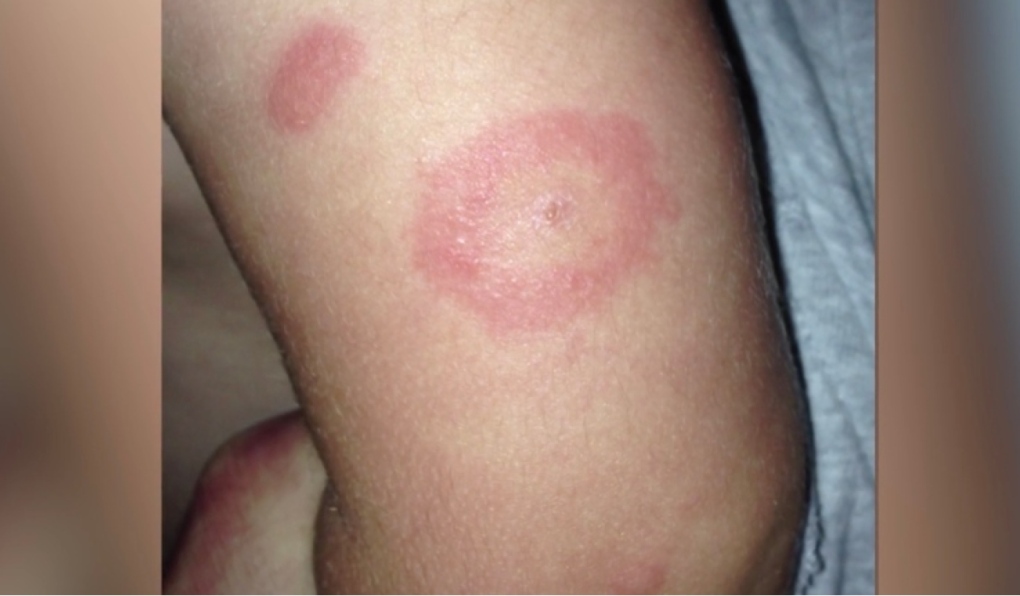Adult tests positive for Lyme disease: Sudbury health unit
Lab results have confirmed a northern Ontario adult has tested positive for Lyme disease and likely acquired it in the Manitoulin District, health officials say.
Public Health Sudbury & Districts said in a news release Wednesday morning that while locally acquired cases remain uncommon, investigations indicate it happened in the Manitoulin Island area.
An adult from Manitoulin tested positive for the same disease last August.
"Blacklegged ticks infected with the bacteria that causes Lyme disease have been found in the Sudbury and Manitoulin districts in past years; however, they are commonly found in rural areas along the north shores of Lake Erie, Lake Ontario, Lake Superior, and the St. Lawrence River, as well as in the Rainy River area of northwestern Ontario," the health unit said.
Experts advise people to check for ticks immediately after outdoor activity, such as gardening or hiking.
"Blacklegged ticks do not jump or fly. They wait on grass and bushes for animals or humans to brush against the vegetation. Ticks vary in size and colour and can be hard to see until they are full of blood," the health unit said.
"If left untreated, Lyme disease can cause serious complications to the heart, joints, and nervous system."
Ways to prevent tick bites include:
- Wear a long-sleeved, light-coloured shirt, pants and closed-toe shoes
- Use insect repellant
- Avoid walking in tall grass
- Clear yard of debris and overgrown vegetation
- Do a tick check after being outdoors
- Take a shower after outdoor activity
Here is what to do if you find a tick:
- Use fine-tipped tweezers to grab the tick close to the skin and gently pull it straight up
- Wash area with soap and water
- Put the tick in a dry container and bring it to the nearest health unit for testing
- See a health care professional to find out if you need treatment, you may require antibiotics
Here are some signs to watch out for:
- A rash that looks like a red bullseye around the bite area
- Fever, headache and joint pain
- Fatigue, stiff neck and swollen glands
 A blacklegged tick found locally has tested positive for the bacteria that can cause Lyme disease, Public Health Sudbury & Districts said Monday. (File)
A blacklegged tick found locally has tested positive for the bacteria that can cause Lyme disease, Public Health Sudbury & Districts said Monday. (File)
CTVNews.ca Top Stories

Statistics Canada reports real GDP grew 0.3 per cent in October
Statistics Canada says the economy grew 0.3 per cent in October, helped by strength in the mining, quarrying, and oil and gas extraction sector, following a 0.2 per cent increase in September.
Greenland is not for sale, its leader says in response to Trump
Greenland is not for sale, its elected leader said on Monday, responding to comments made by U.S. president-elect Donald Trump regarding the 'ownership and control' of the vast Arctic island that has been part of Denmark for over 600 years.
LIVE UPDATES Parts of Ontario under snowfall warning Monday as holiday travellers hit the road
Holiday travellers and commuters could be in for a messy drive on Monday morning as a significant round of snowfall moves into the region. Here are live updates on the situation in Toronto.
U.S. House Ethics report finds evidence Matt Gaetz paid thousands for sex and drugs including paying a 17-year-old for sex in 2017
The U.S. House Ethics Committee found evidence that former Rep. Matt Gaetz paid tens of thousands of dollars to women for sex or drugs on at least 20 occasions, including paying a 17-year-old girl for sex in 2017, according to a final draft of the panel's report on the Florida Republican, obtained by CNN.
The rent-a-friend industry is booming among Canada's Chinese diaspora
Dozens of people are offering rent-a-friend services on Xiaohongshu, a social media platform also known as Little Red Book or China's Instagram, in cities including Vancouver, Calgary and Toronto.
Biden gives life in prison to 37 of 40 federal death row inmates before Trump can resume executions
U.S. President Joe Biden announced on Monday that he is commuting the sentences of 37 of the 40 people on federal death row, converting their punishments to life imprisonment just weeks before president-elect Donald Trump, an outspoken proponent of expanding capital punishment, takes office.
Nordstrom agrees to US$6.25B buyout deal from founding family
Nordstrom said on Monday it would be acquired by its founding family and Mexican retailer El Puerto de Liverpool in an all-cash deal valuing the department store chain at about US$6.25 billion.
Green Party's Elizabeth May reflects on unprecedented week in Canadian politics
Elizabeth May says in all her years on Parliament Hill she has never seen anything like the last week in Canadian politics.
Nissan and Honda to attempt a merger that would create the world's No. 3 automaker
Japanese automakers Honda and Nissan have announced plans to work toward a merger that would form the world's third-largest automaker by sales, as the industry undergoes dramatic changes in its transition away from fossil fuels.

































